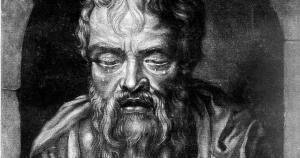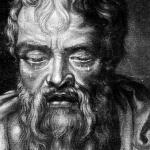 Too often education, even classical education, is training in pompous “assery:” training in the jargon of the spirit of the age berift of actual wisdom. Many teachers do something wonderful in one field (say mathematics) and use this to become gurus for all of life. Pythagoras, he of geometrical fame,* became such a public intellectual and not everybody was happy:
Too often education, even classical education, is training in pompous “assery:” training in the jargon of the spirit of the age berift of actual wisdom. Many teachers do something wonderful in one field (say mathematics) and use this to become gurus for all of life. Pythagoras, he of geometrical fame,* became such a public intellectual and not everybody was happy:
256 Pythagoras, son of Mnesarchus, practised enquiry beyond all other men and selecting these made them his own–wisdom, the learning of many things, artful knavery.**
Some “education,” the sort Pythagoras promoted, is mere training in “artful knavery” or so claimed Heraclitus of Ephesus, one of the first philosophers, who attacked the errors of his day without fear or flattery. He was unpopular with the educational and government rulers, but his pithy, pointed proverbs were memorable.
We only have fragments of Heraclitus, but when he evaluated the School of Pythagoras, Heraclitus seems to have thought Pythagoras was a collector of facts, piles and piles of facts, that Pythagoras used in educational grift. Pythagoras learned a good bit, but remained unwise. He accumulated a good bit of knowledge in service to a long con: the School of Pythagoras.
Beware the man who starts a school in his name: he is either very great, a saint, or a grifter and he is usually a grifter.
The problem with Pythagoras (as Heraclitus sees him) is not his endless desire to know, but “making” what he learns “his own.” A man cannot copyright common knowledge, truths are common to all. His learning was his and this can never be wisdom! When a man sets himself up as a guru, the source of knowledge, then there can be no dialogue only a monologue. The guru dispenses knowledge, the lover of wisdom does whatever he can to find eternal goodness, truth, and beauty that no man can sell or own.
Perhaps the great measure of a real educational institution in our time is, if Heraclitus is correct, that with great cheer, wisdom is shared. Nobody owns wisdom and the task of the school is done for as little profit as possible. After all, if an idea is true, then it is universal: nobody can say “this fact is my own.” If an idea is good, then it belongs to God, the ground of all goodness: nobody can say “this moral truth is mine to sell.” If an idea is beautiful, then it stirs up love and no lover would hire out the beloved for money. A true lover venerates the beloved, he does not pimp her out for profit.
Heraclitus is right. We cannot learn by merely accumulating facts. We cannot “own” the facts. We can take the facts and reason about them in a community of students. Education says: “this is not my own.”
False education is “artful,” because it is always marketing or selling something. It cajoles, persuades, covers up: the ad man is more important than the teacher. The moment such artfulness appears, the school, college, or church becomes the seat of knaves: rascals who will loan you money to gain what is the common inheritance of humankind.
Heraclitus saw the Pythagorean “school” and saw the grift and gain. He despaired.
Christians who have freely received the Word made flesh on Christmas Day must not create usurious X-mass education based on debt. Christians who see He is risen on Easter Sunday must not sell preferred seating to see the Risen Lord. Instead, freely we have received, freely we must give.
Nothing we know is our own. There are no gurus in the Kingdom of Heaven. If charge we must (and we must), then still we shan’t turn away any student for inability to pay. Why?
Nothing we teach, as Heraclitus speculated, is our own.
God save us from the artful knavery of the the Colleges of today.
————————————
*We are unsure if Pythagoras existed or just a school of thought that used him as a founding figure.
**Kirk, Raven, Schofield Presocratic Philosophers.












